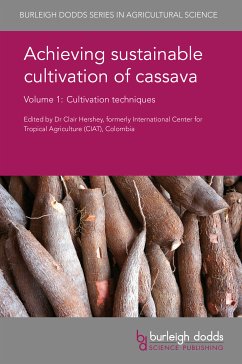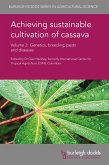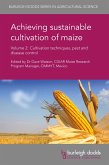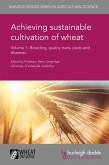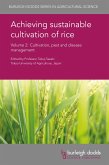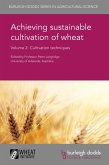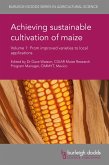'This book will provide a thorough state of the art on cassava research. The book benefits from bringing together professionals with a broad interdisciplinary expertise in cassava and a value-chain perspective in their writing. This book will be a welcome source of knowledge to facilitate the sustainable intensification of cassava farming globally.' (Rodomiro Ortiz, Professor of Genetics and Plant Breeding, Swedish University of Agricultural Sciences; former Deputy Director General/Director of Research for Development, International Institute of Tropical Agriculture (IITA, Nigeria), and Director at the International Crops Research Institute for the Semi-Arid Tropics (ICRISAT, India) and International Center for Maize and Wheat Improvement(CIMMYT, Mexico))
Originating in South America, cassava is now grown in over 100 countries around the world. It is the third most important source of calories in the tropics after rice and maize. Its caloric value, as well as its ability to tolerate dry conditions and poor soils, makes it a key food security crop in developing countries, particularly in Africa. As demand for food grows, there is an urgent need to increase yields in the face of such challenges as climate change, threats from pests and diseases and the need to make cultivation more resource-efficient and sustainable.
Drawing on an international range of expertise, this collection focuses on ways of improving the cultivation of cassava at each step in the value chain, from breeding to post-harvest storage. Volume 1 starts by reviewing current issues facing cassava cultivation around the world before discussing methods for sustainable intensification such as rotations, intercropping and more efficient nutrient management.
Achieving sustainable cultivation of cassava Volume 1: Cultivation techniques will be a standard reference for agricultural scientists in universities, government and other research centres and companies involved in improving cassava cultivation. It is accompanied by Volume 2 which reviews breeding, pests and diseases.
Dr Clair Hershey is Cassava Program Leader at the world-famous International Center for Tropical Agriculture (CIAT) in Colombia. With a background in plant breeding, Dr Hershey has previously worked for the FAO and the Global Partnership Initiative for Plant Breeding Capacity Building (GIPB) and was Editor of Plant Breeding News.
Originating in South America, cassava is now grown in over 100 countries around the world. It is the third most important source of calories in the tropics after rice and maize. Its caloric value, as well as its ability to tolerate dry conditions and poor soils, makes it a key food security crop in developing countries, particularly in Africa. As demand for food grows, there is an urgent need to increase yields in the face of such challenges as climate change, threats from pests and diseases and the need to make cultivation more resource-efficient and sustainable.
Drawing on an international range of expertise, this collection focuses on ways of improving the cultivation of cassava at each step in the value chain, from breeding to post-harvest storage. Volume 1 starts by reviewing current issues facing cassava cultivation around the world before discussing methods for sustainable intensification such as rotations, intercropping and more efficient nutrient management.
Achieving sustainable cultivation of cassava Volume 1: Cultivation techniques will be a standard reference for agricultural scientists in universities, government and other research centres and companies involved in improving cassava cultivation. It is accompanied by Volume 2 which reviews breeding, pests and diseases.
Dr Clair Hershey is Cassava Program Leader at the world-famous International Center for Tropical Agriculture (CIAT) in Colombia. With a background in plant breeding, Dr Hershey has previously worked for the FAO and the Global Partnership Initiative for Plant Breeding Capacity Building (GIPB) and was Editor of Plant Breeding News.
Dieser Download kann aus rechtlichen Gründen nur mit Rechnungsadresse in A, D ausgeliefert werden.

